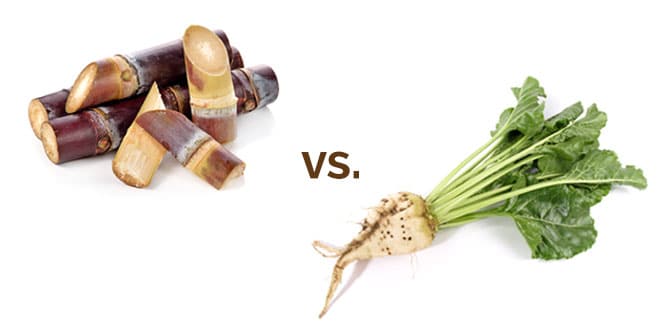For a long time, I thought sugar was only produced from cane until I discovered that about 55 to 60 percent of all sugars that are produced in the United States is made from sugar beets.
Variety of foods including sweets, sodas, baked foods, and processed foods are made from both beet roots and cane sugar.
You may be wondering how possible it is to distinguish between these two varieties of sugar and this article will answer that question and more.
What if beet sugar?
Before we point out the difference between both types of sugar, let’s talk about the origin of beet sugar. This kind of sugar is derived from the plant called sugar beet which is a root vegetable that is closely related to chard and beetroot.
Asides sugarcane, the sugar beets are one of the plants commonly used for the production of the famous white sugar you have in your dining table.
The sugar beet plant is also used in the production of other kinds of refined sugars such as brown sugar and molasses. Nevertheless, you may never come across a product that states the source of the sugar used in its production on the label.
Thus, you can’t tell if it’s sweetened with cane sugar or beet sugar. Now that we have clearly explained the sources of both cane sugar and beet sugar let’s examine some of their differences.
Difference in production
One significant difference between cane sugar and beet sugar is the method of processing and production.
To produce beet sugar, the company has to slice the sugar beet plant into thin strips then proceed to extract the sugar juice that it contains. The next step is the purification and hearing of the juice to form a syrup which is after that crystallised to become the granulated sugar you consume.
Sugar made from cane also follows a similar process. But in a lot of cases, it is processed using bone char which is an ingredient derived from charred animal bones. The job of the bone char is to help with the bleaching and filtration of white sugar.
You will never notice the bone char in the finished product. However, people like vegetarians and others that are looking to reduce their intake of foods and drinks made from animal products may find this piece of information important.
Also, bear in mind that other products including coal-based activated carbon are used alot in the production of white sugar as a healthier alternative for vegetarians instead of bone char.
They work differently in recipes
When it comes to nutrition, both beet sugar and cane sugar provide almost the same things. However, they function differently in recipes.
One reason why the work differently is that they do not have the same taste and using one instead of the other may alter the original flavour of a particular dish.
The beet sugar has a very earthy, oxidised aroma with an aftertaste of burnt sugar while the sugar made from cane had a fruity aroma and rather sweeter aftertaste.
Also, some bakers and chefs have discovered that various sources of sugar may alter the texture of some particular foods and even the appearance of the final product.
For caramelisation, cane sugar is the best option because it leaves you with a very uniform outcome than when you use beet sugar. For a rather crunchy texture and a very unique taste that will help certain foods stand out, you can depend on the beet sugar for the best result.
The similarity in nutritional composition
There are several differences between cane and beet sugar, but regarding nutrition, they are almost the same thing. Regardless of the source of any refined sugar, the result is always pure sucrose. Sucrose is a compound that contains both molecules of fructose and glucose.
What this means is that if you are afraid of excessive weight gain and you are going one of these sugars will be healthier than the other in this aspect, you need to think again.
Consuming a high amount of cane or beet sugar can cause diabetes, contribute to weight gain, liver problems, and even heart disease.
A few health organisations have recommended that you limit your daily sugar intake to below six teaspoons which are 24 grams of sugar for women, and below nine teaspoons which are 36 grams for men.
This quantity is not restricted to the sugar you add to your tea, it includes both the sugars in the desserts, sweets and drinks you consume on a daily basis.
The issue of genetically modified sources
One major reason why a lot of people will rather go for sugar produced from cane instead of sugar produced from beet is the concern about genetically modified organisms popularly called GMO.
It has been estimated that about 95 percent of the sugar beets used for the production of beet sugar in the United States are genetically modified. Whereas, the sugarcane grown in the United States of even imported for the production of cane sugar are non-GMO.
This is not to say that genetically modified sources of food are bad. In fact, there are plenty of individuals around the world who are of the opinion that genetically modified plants are a sustainable food source that is highly resistant to herbicides, insects, and also extreme weather conditions.
On the other hand, another population of people would rather avoid genetically modified foods because of concerns like allergic reactions, antibiotic resistance, and other health risks that may be associated with eating such foods.
Noteworthy is the fact that some animal studies have been able to point out that the consumption of genetically modified organisms may have a toxic effect on the pancreas, liver, kidney, and even the reproductive system.
However, studies to prove its effects on humans remain limited. Some other studies have also shown that GMO crops are safe for human consumption and may they even have a nutrient profile that may be compared to that of conventional crops.
If you are one of those people who are not exactly comfortable with consuming GMO foods, it is safer to stick to cane sugar or search for the non-GMO variety of beet sugar.





